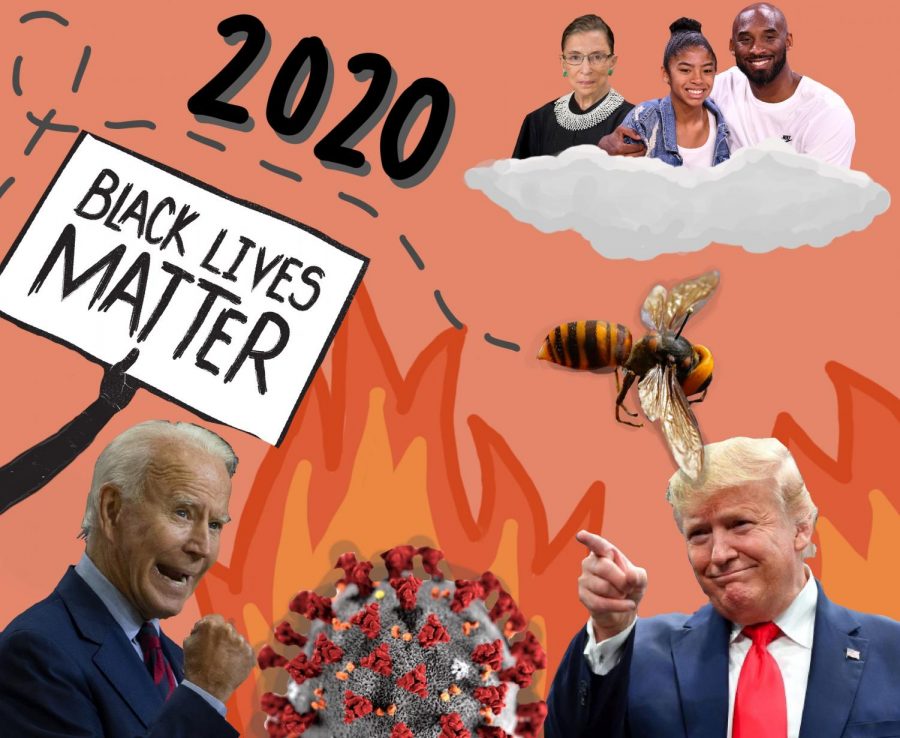2020: More like 2,020 problems
A look back at the major events of 2020
Photo Illustration: Megan Evans/FHS Press
2020 was a year full of noteworthy and historic events.
From a global pandemic to a presidential election, 2020 was packed to the fullest with events. Some of the events were marvelous, while others were quite the opposite. Everyone experienced this year in different ways, but most don’t exactly look at 2020 with love and admiration in their eyes.
Right off the bat, 2020 started with the Australian wildfires. The Verge says that on Jan. 1, Australia’s capital reported terrible pollution with an air quality index 23 times higher than what’s considered hazardous.
“I felt bad for everything that was going on over there because the animals were all dying, and it was just rough on everyone,” sophomore Megan Jones said.
On Jan. 15, The House voted to send articles of impeachment against President Donald Trump to the Senate. He was accused of abuse of power and obstruction of Congress. However on Feb. 5, The Senate acquitted President Trump.
On Jan. 26, basketball star Kobe Bryant and others passed away in a helicopter crash. This event left many heartbroken, mourning the loss of their basketball idol.
Although the first reported COVID-19 case in the United States was in January, most people started becoming aware of COVID-19 on March 11 when The World Health Organization declared the virus outbreak a pandemic.
On March 13, school districts had to shut down in-person instruction and switch to fully virtual instruction in hopes of the pandemic getting better. However, the pandemic was getting worse and schools had to stay virtual for the rest of the school year.
“At first I was really mad school was canceled because I enjoyed getting to go to school and see my friends and teachers. But now that we have been virtual for almost two nine weeks, I have gotten used to it and honestly enjoy it so much now,” Jones said.
By March 26, there were 3.28 million Americans filed for unemployment due to staying home. The economy was failing, so on March 25, the Senate and White House agreed on a two million dollar stimulus package.
On April 3, the CDC recommended that everyone should wear face masks in public. This was a controversial topic because some people thought masks would not work while others felt masks were necessary. By April 27, the United States COVID-19 cases surpassed one million.
“I choose to wear a mask because it can protect others who are more affected by COVID-19,” sophomore Sydney Beringer said.
On May 25, a viral video captured George Floyd getting killed by a police officer who knelt on his neck for eight minutes. The media roared for justice for him and other citizens of color who were treated with racial injustice. Protests over George Floyd’s death, Ahmaud Arbery’s death, Breonna Taylor’s death and many others spread nationwide. Throughout June and July, people continued protests and demanded for justice.
“While I do not agree with violence, I would be outraged over yet another unjustified death and would want my voice heard as well. Racism has been screamed about for so long and nobody has listened, they wanted their voices heard and did what they had to do to raise some attention,” junior Alexis Rinere said.
On Aug. 16, thunderstorms and the dry climate of California triggered monstrous wildfires. The state suffered from the third largest wildfire in its history. Another fire continued to burn until Sept. 9, and it became California’s number one largest wildfire. By Sept. 6, 2.1 million acres in California were burnt.
On Sept. 18, Supreme Court Justice Ruth Bader Ginsburgh (RBG) died at the age of 87. On Sept. 26, President Trump chose Judge Amy Coney Barrett to fill in RBG’s spot. On Oct. 26, the Senate confirmed her to take the position.
On Sept. 29, the first presidential debate took place. Many described it as a hot mess considering the informality of both presidential candidates. President Trump and Joe Biden threw insults, and they interrupted each other many times.
On Oct. 1, President Trump and Melania Trump tested positive for COVID-19. Trump went to Walter Reed National Military Medical Center for treatment. On Oct. 5, Trump returned to the White House and had a speedy recovery.
The presidential election took place on Nov. 3. President Trump believed mail-in ballots contained voter fraud, so he filed multiple lawsuits and demanded for recounts. Nevertheless, on Nov. 7, news organizations declared that Joe Biden had won enough electoral college votes to win the presidency. On Dec. 14, the electoral college confirmed Joe Biden’s victory.
On Dec. 14, the first COVID-19 vaccine was released. The first vaccinations went to front-line healthcare workers, residents of long-term care facilities and other at-risk groups.
All in all, 2020 was a year nobody will forget. It quite literally will go down in history. Maybe it wasn’t completely amazing, but in 50 years it could be fun to brag about living through the “cursed” year.



